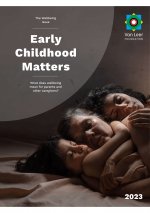
Early Childhood Matters 2023 - The Wellbeing Issue - What does wellbeing mean for parents and other caregivers?
Omschrijving
Early Childhood Matters aims to elevate key issues, spread awareness of promising solutions to support holistic child development and explore the elements needed to take those solutions to scale. It is published annually by the Van Leer Foundation. The views expressed in Early Childhood Matters are those of the authors and do not necessarily reflect those of the Van Leer Foundation. Initiatives featured are not necessarily funded by the Van Leer Foundation.
Birth of a parent
Just a few years into the world, the little girl did not yet grasp the idea that her father had a life before her. The story portrayed the curious, often funny process babies and toddlers go through as they develop a sense of who they are in relation to other people.
Having since become a father, I reflect on this story differently. As Lucy Jones puts it in her article for this journal, it reminds me that when a baby is born, a parent is also born.
Over the last 50 years scientists have learned a lot about early childhood. Amid the growing body of research, I have always found the neuroscience particularly compelling. During the early years of a child’s life, the brain makes one million new neural connections every second. I love talking to people about this fact and showing them images of babies’ neural networks, which look like celestial bodies. I see their sense of wonder when they hear this information for the first time. I think science has helped us understand why our earliest experiences shape so much of the people we become. It has given us a powerful window into how the early years are written into our bodies.
These insights have made their way into the cultural zeitgeist. Parents now obsess about how interactions with their children today can shape their futures. We have become fixated on how we shape them. This has generated new thinking and interest about what babies and toddlers need to thrive. It has stimulated an immense body of popular literature on the topic of parenting and – in some countries – led to important changes in healthcare and education.
But all of this has not changed our understanding of parenthood in the same way. We have not put the same level of scientific and cultural energy into asking the question: how do they shape us?
